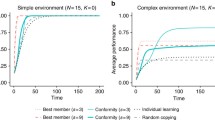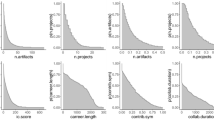Abstract
Most organizations encourage the formation of teams to accomplish complicated tasks, and vice verse, effective teams could bring lots benefits and profits for organizations. Network structure plays an important role in forming teams. In this paper, we specifically study the dynamics of team formation in large research communities in which knowledge of individuals plays an important role on team performance and individual utility. An agent-based model is proposed, in which heterogeneous agents from research communities are described and empirically tested. Each agent has a knowledge endowment and a preference for both income and leisure. Agents provide a variable input (‘effort’) and their knowledge endowments to production. They could learn from others in their team and those who are not in their team but have private connections in community to adjust their own knowledge endowment. They are allowed to join other teams or work alone when it is welfare maximizing to do so. Various simulation experiments are conducted to examine the impacts of network topology, knowledge diffusion among community network, and team output sharing mechanisms on the dynamics of team formation.
Access this chapter
Tax calculation will be finalised at checkout
Purchases are for personal use only
Preview
Unable to display preview. Download preview PDF.
Similar content being viewed by others
References
Gaston, M., desJardins, M.: Agent-organized Networks for Dynamic Team Formation. In: AAMAS 2005, pp. 230–237 (2005)
Cohen, R., Levesque, H.J., Smith, I.: On Team Formation. In: Contemporary Action Theory, pp. 87–114 (1997)
Wooldridge, M., Jennings, N.: The Cooperative Problem Solving Process. Journal of Logic and computation 9(4), 563–592 (1999)
Tambe, M.: Towards Flexible Teamwork. Journal of artificial intelligence Research 7, 83–124 (1997)
Durfee, D.H., Lesser, V.R.: Partial Global Planning: A Coordination Framework for Distributed Hypothesis Formation. IEEE Transactions on Systems, Man, and Cybernetics 21(5), 1167–1183 (1991)
Newman, M.E.: The Structure and Function of Complex Networks. SIAM Review 45, 167–256 (2003)
Strogatz, S.: Exploring Complex Networks. Nature 410, 268–276 (2002)
Axtell, R.: Non-Cooperative Dynamics of Multi-Agent System. In: Proceedings of the international conference on autonomous agents and multi-agent systems, Bologna, Italy (2002)
Axtell, R.: The Emergence of Firms in a Population of Agents: Local Increasing Returns. Unstable Nash Equilibria, and Power Law Size Distributions. Working paper (1999)
Li, J., Sun, D.: Knowledge Propagation Model in Complex Networks. Journal of South China University of Technology 34(6) (2006) (in Chinese)
(Last visited October 15, 2008), http://repast.sourceforge.net/index.html
Watts, D., Strogatz, S.: Collective Dynamics of “Small-World” Networks. Nature 393, 440–442 (1998)
Cowan, R., Jonard, N.: Network Structure and Diffusion of Knowledge. Journal of economic dynamics and control 28, 1557–1575 (2004)
Cowan, R., Jonard, N., Zimmermann, J.B.: Evolving Networks of Inventors. Journal of Evolutionary Economy (16), 155–174 (2006)
Gaston, M., desJardin, M.: The Effect of Network Structure on Dynamic Team Formation in Multi-Agent Systems. Computational Intelligence 24(2), 122–157 (2008)
Cowan, R., Jonard, N., Zimmermann, J.B.: Bilateral Collaboration and the Emergence of Innovation Networks. Management Science 53(7), 1051–1067 (2007)
Collins, J., Chow, C.: It’s a small world. Nature 393, 409 (1998)
Author information
Authors and Affiliations
Editor information
Editors and Affiliations
Rights and permissions
Copyright information
© 2009 ICST Institute for Computer Science, Social Informatics and Telecommunications Engineering
About this paper
Cite this paper
Sun, C., Wan, Y., Chen, Y. (2009). Dynamics of Research Team Formation in Complex Networks. In: Zhou, J. (eds) Complex Sciences. Complex 2009. Lecture Notes of the Institute for Computer Sciences, Social Informatics and Telecommunications Engineering, vol 5. Springer, Berlin, Heidelberg. https://doi.org/10.1007/978-3-642-02469-6_77
Download citation
DOI: https://doi.org/10.1007/978-3-642-02469-6_77
Publisher Name: Springer, Berlin, Heidelberg
Print ISBN: 978-3-642-02468-9
Online ISBN: 978-3-642-02469-6
eBook Packages: Computer ScienceComputer Science (R0)




